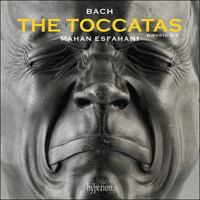JS BACH Toccatas (Esfahani)
View record and artist detailsRecord and Artist Details
Composer or Director: Johann Sebastian Bach
Genre:
Instrumental
Label: Hyperion
Magazine Review Date: 09/2019
Media Format: CD or Download
Media Runtime: 77
Mastering:
DDD
Catalogue Number: CDA68244

Tracks:
| Composition | Artist Credit |
|---|---|
| (7) Toccatas |
Johann Sebastian Bach, Composer
Johann Sebastian Bach, Composer Mahan Esfahani, Harpsichord |
Author: Patrick Rucker
Mahan Esfahani, the Iranian-American harpsichordist now based in Prague, has chosen the Toccatas as the first release of his renewed relationship with Hyperion (having decamped temporarily to DG). He plays a 2018 harpsichord from the workshop of Jukka Ollikka in Prague, after Michael Mietke, ‘with the hypothetical addition of an extra soundboard for the 16' register and a cheek inspired by Pleyel, 1912’. In the abstruse booklet notes, Esfahani cites some 18 sources he used to compile his own ‘variorum’ text for the recording.
Yet, despite the ostensible intellectual rigour of the presentation, the quality one most yearns for in these performances is that key element of improvisatory spontaneity. Esfahani’s rhythm can be mechanistically relentless for long stretches, seemingly disregarding what we know of Baroque dance. This rigidity of pulse is combined with a reluctance to exploit the naturally rich, sensuous sonorities of the harpsichord, hobbling its ability to sing. Taken as a whole, in place of the imaginative freedom inherent in Bach’s Toccatas, Esfahani’s approach sounds unyielding, pressured and constrained.
Rather than exultation in the grandeur of open D major sonorities at the beginning of BWV912, we hear a hectic pile-up of descending chords, devoid of sensuality or breathing space. The ensuing Allegro speaks more of crafty ill-temper than rustic jauntiness. The gripping pathos of the Adagio of BWV913 is obscured by weirdly elaborate couplings which result in muddy sonorities. Rigidly sharp-edged, jabbing figurations in the fugal finale of BWV914 have more in common with the uncompromising angles of 1950s brutalist architecture than with the fluid contours of Baroque architecture or painting.
If, as some publicity has suggested, this is indeed the beginning of a series of recordings that will encompass all of Bach’s harpsichord music, we have a long road in front of us.
Discover the world's largest classical music catalogue with Presto Music.

Gramophone Digital Club
- Digital Edition
- Digital Archive
- Reviews Database
- Full website access
From £8.75 / month
Subscribe
Gramophone Full Club
- Print Edition
- Digital Edition
- Digital Archive
- Reviews Database
- Full website access
From £11.00 / month
Subscribe
If you are a library, university or other organisation that would be interested in an institutional subscription to Gramophone please click here for further information.




